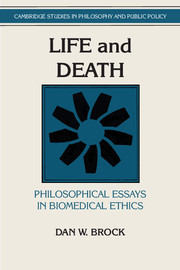Book contents
- Frontmatter
- Contents
- Sources and acknowledgments
- Introduction
- PART I PHYSICIANS AND PATIENTS MAKING TREATMENT DECISIONS
- PART II LIFE-AND-DEATH DECISIONS IN THE CLINIC
- 4 Moral rights and permissible killing
- 5 Taking human life
- 6 Death and dying
- 7 Forgoing life-sustaining food and water: Is it killing?
- 8 Voluntary active euthanasia
- PART III LIFE-AND-DEATH DECISIONS IN HEALTH POLICY
- Index
4 - Moral rights and permissible killing
Published online by Cambridge University Press: 05 June 2012
- Frontmatter
- Contents
- Sources and acknowledgments
- Introduction
- PART I PHYSICIANS AND PATIENTS MAKING TREATMENT DECISIONS
- PART II LIFE-AND-DEATH DECISIONS IN THE CLINIC
- 4 Moral rights and permissible killing
- 5 Taking human life
- 6 Death and dying
- 7 Forgoing life-sustaining food and water: Is it killing?
- 8 Voluntary active euthanasia
- PART III LIFE-AND-DEATH DECISIONS IN HEALTH POLICY
- Index
Summary
In what types of cases that arise in the practice of medicine is it morally permissible to kill human beings? My discussion of this question will largely involve working out some implications of a particular type of normative moral theory for the question of terminating human life in medical settings. However, the very substantial and often heated disagreement that arises over these issues amounts to more than simply disagreement over the implications of the kind of view I shall develop. Rather, it arises in large part because participants in the disputes hold general moral views of fundamentally different sorts. In the emotionally charged context in which these discussions often take place, and where the specifics of particular cases often occupy much of the attention, the deeper sources of the moral disagreement encountered are often obscured. I shall begin then with a brief attempt to illuminate some of those sources.
How one divides and distinguishes substantive moral theories is largely a matter of convenience, in the sense that it depends on the purpose of the inquiry at hand and the usefulness to that inquiry of carving up the geography of normative ethics in that particular way. No general distinctions between types of normative theories which delineate broad categories of such views are the correct distinctions or categories; any quite general distinctions will at the very least blur differences that are important in other contexts.
- Type
- Chapter
- Information
- Life and DeathPhilosophical Essays in Biomedical Ethics, pp. 95 - 122Publisher: Cambridge University PressPrint publication year: 1993
- 2
- Cited by



